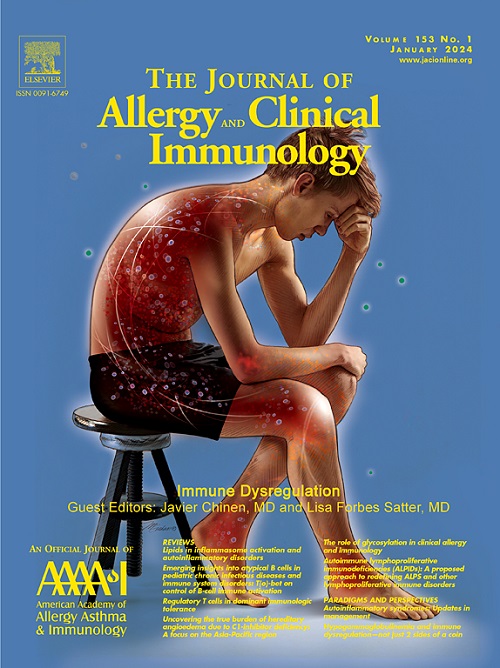Consensus summary on the definition of asthma remission
IF 11.2
1区 医学
Q1 ALLERGY
引用次数: 0
Abstract
Striving for clinical remission in asthma is a new approach to treatment whose time has come. It is critical that a widely accepted definition of asthma clinical remission be developed that is agreed to be both practical and meaningful to clinicians, researchers, and patients. To advance this development process, National Jewish Health convened a panel of experts in the field for a 2-day virtual workshop to critically assess previously proposed definitions of remission in asthma and other immune-mediated diseases and the latest evidence from clinical studies of remission in patients with asthma treated with biologic therapies. After careful deliberation, we present the panel’s definition of asthma clinical remission and identify unresolved issues that deserve further investigation and wider discussion among different stakeholder groups.
This article is part of a supplement supported by an educational grant from AstraZeneca Pharmaceuticals. The content of this article was developed independently by National Jewish Health and the article authors.
关于哮喘缓解定义的共识总结
争取哮喘的临床缓解是一种新的治疗方法,时机已经成熟。制定一个被广泛接受的哮喘临床缓解定义是至关重要的,该定义对临床医生、研究人员和患者都是实用和有意义的。为了推进这一发展进程,国家犹太健康组织召集了该领域的专家小组,进行了为期2天的虚拟研讨会,以严格评估先前提出的哮喘和其他免疫介导疾病缓解的定义,以及接受生物疗法治疗的哮喘患者缓解的临床研究的最新证据。经过仔细考虑,我们提出专家组对哮喘临床缓解的定义,并确定值得进一步调查和不同利益相关者群体之间更广泛讨论的未解决问题。本文是由阿斯利康制药公司教育资助的增刊的一部分。这篇文章的内容是由国家犹太人健康和文章作者独立开发的。
本文章由计算机程序翻译,如有差异,请以英文原文为准。
求助全文
约1分钟内获得全文
求助全文
来源期刊
CiteScore
25.90
自引率
7.70%
发文量
1302
审稿时长
38 days
期刊介绍:
The Journal of Allergy and Clinical Immunology is a prestigious publication that features groundbreaking research in the fields of Allergy, Asthma, and Immunology. This influential journal publishes high-impact research papers that explore various topics, including asthma, food allergy, allergic rhinitis, atopic dermatitis, primary immune deficiencies, occupational and environmental allergy, and other allergic and immunologic diseases. The articles not only report on clinical trials and mechanistic studies but also provide insights into novel therapies, underlying mechanisms, and important discoveries that contribute to our understanding of these diseases. By sharing this valuable information, the journal aims to enhance the diagnosis and management of patients in the future.

 求助内容:
求助内容: 应助结果提醒方式:
应助结果提醒方式:


